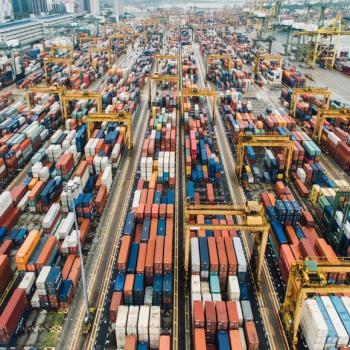 A new post from Greg Forster over at the Kern Pastors Network blog asks us to think about that question. Greg is responding to the “widespread chatter” about a recent book on capitalism by Thomas Piketty (we talked about the book a few weeks ago in this very space.)
A new post from Greg Forster over at the Kern Pastors Network blog asks us to think about that question. Greg is responding to the “widespread chatter” about a recent book on capitalism by Thomas Piketty (we talked about the book a few weeks ago in this very space.)
Greg begins by noting,
The widespread chatter about Thomas Piketty’s book “Capital in the Twenty-First Century” is both good news and bad news. The good news is that people are intensely interested in the problem of inequality. The bad news is that they are interested in the wrong kind of inequality.
The inequality people are talking about is unequal possession of money. The more important challenge is unequal respect for human dignity. Address that, and the money issues will not only seem less important, they will also become less difficult – and in ways you would have never discovered as long as you were thinking about money instead of dignity.
Why are we having this kind of chatter? Because our minds haven’t caught up with our money yet:
Today, we face a reality unprecedented in the whole history of the world: we are not starving. Traditional modes of social organization have all been designed to meet what was, until very recently, the central challenge of all human life: keeping food on the table. Even now, 200 years after the Industrial Revolution, we haven’t really figured out how to organize social systems for an environment in which the problem of starvation has basically been solved.
The modern, entrepreneurial economy creates wealth. This has had an extraordinary, transformative effect on every aspect of human life in modern civilization. Without it, you couldn’t sustain democracy, modern medicine, free speech, technological advancement, a public role for women, or any of the other blessings of modern life that we take for granted every day.
However, because it creates wealth, the entrepreneurial economy also creates large, new inequalities of wealth. Before modern times, there just wasn’t enough money for the disparities of wealth to grow very large. Only in the past two centuries has there been enough economic growth for larger inequalities to occur. And we haven’t figured out what we should think and do about it.
He compares Zacchaeus the tax collector to the modern situation:
With 97 percent of the population living within shouting distance of starvation, Zacchaeus didn’t need much money to swagger around town and lord it over everyone. The average American today – that’s you and I – is almost certainly many times wealthier than Zacchaeus. In fact, modern Americans in the upper middle class, far below the highest ranks of the modern wealthy, are probably richer than Caesar himself. Think about that the next time you read the book of Luke!
Let’s be clear: our problem today is not a lack of money. Recent big-think pieces in the New York Times and on National Public Radio have begun with the astonishing observation that in modern America, even the poor have all the money they really need. They have lots of problems, some of them shocking and urgently in need of help. But they also have food, clothing, shelter, cars, phones, televisions, and computers. If money could have solved their most pressing problems, it would have by now.
So, what’s broken? Relationships, says Greg:
Our problem is broken relationships and systems, and they’re broken at multiple levels. Among the poor, the most basic relationships of human life – family and work – are broken. Nothing else will get better if this problem is not dealt with.
But the chatter about Piketty’s book shows that our broken relationships are not confined to the poor. Inequality of incomes fascinates us, in spite of it having little relevance to helping those in need, because our relationships with ourselves, our money, and our fellow citizens is broken.
Because we have believed the deceitfulness of riches, we are becoming more and more obsessed with who has how much of what. The modern economy has produced huge fortunes. How can we get our hands on some of it?
Ironically, he adds, we got here because we were trying to get somewhere else:
Ironically, what produced the modern economy in the first place was not the pursuit of money. It was the pursuit of equal respect for human dignity. The most important catalyst of the Industrial Revolution was an Institutional Revolution: the belief that people outside the ruling class had human dignity led society to give more and more people the right to work, earn, buy, sell, save, and build. That’s the entrepreneurial economy.
And we need to be careful we do not return to a position that treats only some people as, well, people:
Zacchaeus may not have had all that much more money than the beggar, by our standards, but he was a human being in the eyes of Roman law. The beggar was not. Zacchaeus could have done almost anything to that beggar with impunity. He could have spat on him, beat him, taken away the few pennies he had, or even killed him and paid no price for it. And in his way, that is actually what he did to thousands of people, year after year – until he met Jesus.
Don’t think for a moment that America could never go back to that kind of inequality, treating only some people as human. In most of the world, unequal protection of economic rights is still normal. Recent victories by hyper-nationalist and even quasi-fascist parties across Europe (they won inFrance, of all places!) are a sobering reminder that there is nothing stopping even the most advanced, civilized nations from a return to the kind of brutal inhumanity that is, both historically and globally, the normal state of human affairs.
The gospel is light and hope. The church can help rebuild broken relationships in communities and remind the world that all people are creators and contributors. When we do this, our neighbors respond. Never underestimate the impact of hope – the reminder that people don’t need to have much money to live in the way God intends for them, and in a way that will give them dignity and community.
He concludes,
What I do know is that human dignity and right relationships matter more than who has how much of what. Can we renew equal human dignity in our time? This will be one of the key challenges the church faces in the coming generation.
How can you address that challenge? How can you create hope? How can you build relationships? Have you done this and do you have a success story to share with the rest of us? Share your ideas below.
Image: KPN.












